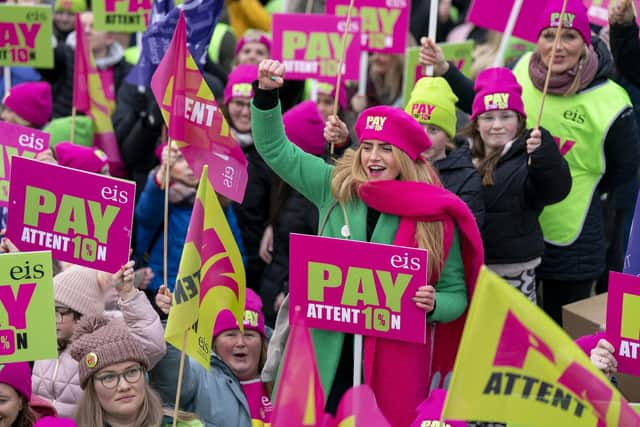Teachers' strike: Union EIS announces 16 more days of strikes which could close schools
and live on Freeview channel 276
The Educational Institute of Scotland (EIS) said action will take place over 16 consecutive days in January and February, with teachers in two local authorities walking out each day.
The action will start – unless a deal is agreed before then – on January 16 and is due to last until February 6.
Advertisement
Hide AdAdvertisement
Hide AdEIS general secretary Andrea Bradley praised the teachers who took part in the first strike on Thursday, saying they had been angered by the conduct of the Scottish Government and local authority body Cosla in presenting their latest offer.
National strike days will also take place on January 10 for teachers in primary and special schools, as well as early years, and on January 11 for those working in secondary schools and secondary special schools.
Announcing the latest action, Ms Bradley said: “The EIS will move ahead with our previously announced two additional days of national strike action in January. We can also now confirm that Scotland’s teachers will strike on 16 consecutive days in January and February, with teachers in two local authorities on strike on each of these 16 days.
“We have been forced into the escalation of this action by the lack of willingness to negotiate properly and to pay teachers properly, by a Government that says it wished to be judged on its record on education. The judgment of Scotland’s teachers on the matter of pay is clear, with the first programme of national strike action that we have engaged in for four decades.
Advertisement
Hide AdAdvertisement
Hide Ad“It is now for the Scottish Government and Cosla to resolve this dispute, and prevent further strike action, by coming back to the negotiating table with a substantially improved pay offer for all of Scotland’s teaching professionals.”


The Scottish Government submitted a pay offer to teachers earlier this week, which was summarily dismissed by the unions. Under that proposal, teachers earning under £40,107 would receive an increase of £1,926 per year – 6.85 per cent for those on the lowest salaries – while those on more would get 5 per cent.
The Government has insisted it has no more cash for pay offers, with education secretary Shirley-Anne Somerville saying any increase in funding would have to come from elsewhere in the budget.
The EIS has been pushing for a minimum of a 10 per cent increase.
Advertisement
Hide AdAdvertisement
Hide AdScottish Labour education spokesman Michael Marra said the announcement of further dates was “inevitable” after the rejection of the previous offer and called on Nicola Sturgeon to take part in negotiations. “That offer had sat on the Cabinet secretary’s desk for weeks and was only signed off with hours to go before the first all-out teachers strike in 40 years,” he said.
“The Scottish Government has badly mishandled the most critical round of public pay negotiations in decades. Money should have been in the budget for public sector pay deals at the start of the budget year. Instead we now have a crisis that is escalating fast. A deal must be struck to avoid these strikes taking place.
“The First Minister must personally come to negotiating table to get a deal done where the Government has failed to dreadfully so far.”
STRIKE SCHEDULE
Monday 16 Jan – Glasgow, East Lothian
Tuesday 17 Jan – Perth and Kinross, North Ayrshire
Wednesday 18 Jan – Orkney, Fife
Thursday 19 Jan – Moray, North Lanarkshire
Friday 20 Jan – Angus, East Dunbartonshire
Monday 23 Jan – East Ayrshire, Dumfries and Galloway
Tuesday 24 Jan – Stirling, East Renfrewshire
Wednesday 25 Jan – South Ayrshire, Edinburgh
Thursday 26 Jan -Midlothian, West Dunbartonshire
Friday 27 Jan- Renfrewshire, Falkirk
Monday 30 Jan – Aberdeenshire, Borders
Tuesday 31 Jan – Highland, West Lothian
Wednesday 1 Feb – Clackmannanshire, Aberdeen
Thursday 2 Feb – Dundee, Argyll and Bute
Friday 3 Feb – South Lanarkshire, Western Isles
Monday 6 Feb – Inverclyde, Shetland
Comment Guidelines
National World encourages reader discussion on our stories. User feedback, insights and back-and-forth exchanges add a rich layer of context to reporting. Please review our Community Guidelines before commenting.